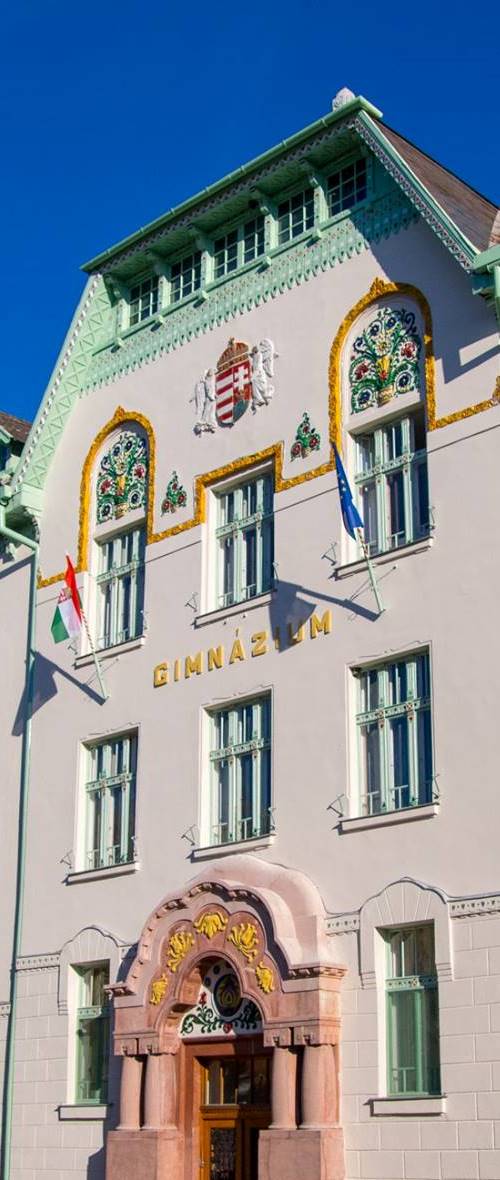There has been secondary grammar school education in the old building of our school, built in secessionist style, since 1920, and which was broadened because of the increasing number of students with a new wing in 1989, then the building of the youth hostel opened in 2001, improved our material conditions further on. The secondary grammar school education has been the basic profile of our institution from the beginnings and it has been developed with various trainings for many years. The Scientific Student Laboratory of Csongrád was revived in 2013 which works as a regional experimental centre and for our students it gives the scene for a versatile and practice oriented development of talent.
In 2017 our last technical class had its leaving exam, so since that time we have run only grammar classes. Currently we offer four-year grammar and science classes as well as an eight-year form. In our grammar classes, students can learn history, Hungarian grammar and literature, creative writing, drama and two foreign languages in a higher number. In our tourism classes, students have the opportunity to learn economics as a general subject. Apart from that, gastronomy, hotel accomodation education, catering and tourism can be learnt. In our science classes, students can choose from courses of mathematics-physics, biology-chemistry to geography-Information Technology. Our pupils can perform experiments connected with the above-mentioned subjects and computer system analysis in our student laboratory.
Several members of the staff took their leaving exams in this school, so we pass on the torch to our students in many cases, we develop the talent spotter’s work of our formers or we open towards new fields.We encourage our students to take part in competitions, our collegues not only give a hand with their prepartion, but also they take part in attempts with exemplary behaviour. János Batsányi Secondary Grammar School of Csongrád can take pride in talent spotter’s work on the field of MTMI dating back several decades. Our work was also helped by the National Talent Program and the subroutine of ’Útravaló’ Scholarship Program , called ’Way to Science’.
Our school introduced and developed the methods of robotics in school education among the firsts in 2005. We have been operating a robotic-engineering classroom with success as a base for competitions, talent development and training of rising generations. In the field of robotics methods of peer helping, workshops and afternoon club electives in our robotic-engineering classroom stood them in good stead/were successful among the uneven-aged students. We have won the title of Research School of the University of Szeged three times. We have been taking part annually in the NI Mentoring Project of National Instrument since 2010. Young IT specialists have been giving lectures to our students within the framework of Epam eKids program for a year. In addition, a Scientific Autotutorial Club functions in our school.
As an innovation, ’the disceptation method’ was introduced in our school in 2010. Every year there are competitions in different parts of the country where students can show their skills in the usage of the techniques. Our students have succeeded in these competitions for several times. Moreover, the aquired techniques help them to make decisions more easily in their everyday life, as well.
Since 2011 our school has been the organiser of the Sudoku Championship which is becoming more and more popular among primary school students studying in Csongrád and the surrounding towns and villages. We host more than a hundred of contestants every year.
The Students Council works actively in the school. The members organize many programmes during a school year, including handcraft workshops, the 15-hour quiz program, thematic weeks, the local Students’ Parliament and probably the most prominent event, the Students’ Day. They are trying to make the school days more colourful, and it considers the initiative of charity very important.
We claim that language teaching in our school is very important. Our students can choose from English or German as their first target language, if they are specialized in Art subject they learn it in 5 hours a week, if in Science subjects they learn it in 3 hours a week. They can choose these two languages as second languages, in addition to this Latin and French are also optional. The second languge is taught in every class in 3 hours, so in this way we make it possible for them to reach the exam level in every language.
Besides teaching the so called general knowledge subjects we also find sport and cultural education important from the point of view of our students’ personality development and cultural awareness in order to be able to recognize the fact that only those people can be successful in the different social – economical areas of life who can constantly renew their personalities mentally, emotionally, physically and live in harmony not just with their outside world but also with themselves. In our school everyday P.E. lessons were introduced in the 2010/2011 school year, so this way –as a reference school – we had the opportunity to work out the practical and professional bases of implementing.
We are proud of our former and current students who have won Olympic, World or European Championship titles. The improvement of talents is a priority, and we ensure positive environmental impacts to improve the students’ creative abilities.Our talented students regularly take part in events where they can show their knowledge. They can experience the diversity of arts and sciences and realize that knowledge is the basis of value creation and the process of creation is one of the most valueable human skills.

